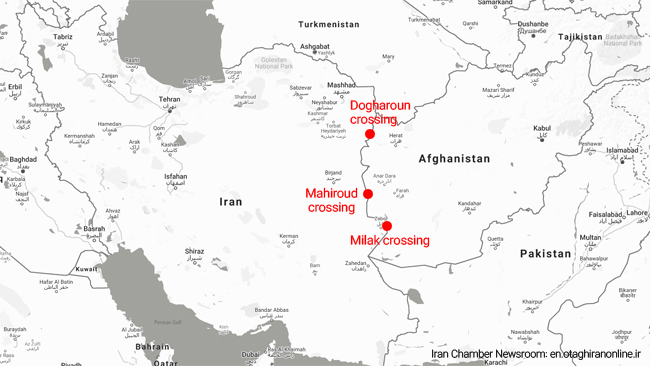Commercial exchanges through Milak border crossing with Afghanistan are back to normal with about 300 trucks crossing the border daily since August 14, a local official in Sistan-Baluchestan province said.
“After some ups and downs over the past two months, commercial exchanges via Milak are back to normal,” Teymour Baqeri, an official with Sistan-Baluchestan Maintenance and Transportation Organization said.
The border crossing was reopened in mid-August after being closed by local authorities over disputes with Afghan truckers who allegedly smuggled fuel from Iran.
A total of 411,567 tons of non-oil goods were traded through Milak border crossing with Afghanistan during the four months ending July 21, Baqeri said.
The Milak border crossing is one of the major strategic junctions that connects landlocked Afghanistan to international waters through Iran.

The map shows the location of main border crossings between Iran and Afghanistan.
The crossing was shut down in early August by local authorities after Afghan truckers blocked the return route of Iranian trucks in retaliation to the impoundment of Afghan trucks in Iran. Over 130 Afghan trucks were impounded for three months by Iranian authorities due to smuggling fuel from Iran to the neighboring country.
There are two other main border crossing between the neighboring countries, namely Mahiroud in South Khorasan Province and Dogharoun in Taybad County of Khorasan Razavi province.
Iran-Afghanistan trade
Afghanistan was Iran’s fourth export destination in the four months leading to July 21. It purchased 2.11 million tons of goods worth $713 million, accounting for 8% of Iran’s total exports in the four months.
Hossein Salimi, the chairman of Iran-Afghanistan Chamber of Commerce, says the coronavirus crisis is expected to reduce Iran’s exports to Afghanistan to $2.9 billion in the current fiscal year (March 2020-21) compared with $3.2 billion in previous years.
Salimi said the neighboring Afghanistan meets 40% of its imports, including construction materials, food and fuel from Iran.
“We intend to improve commercial exchanges with Afghans by making investment in their mining sector. Such investments will increase Afghanistan’s revenues and improve their purchasing power. Iranians’ finance of two projects, including a carbonated soft drink plant, has already begun,” he said.
“The southeastern port of Chabahar has played a pivotal role in supplying Afghanistan’s essential goods. That has urged some Afghans to make investments there. A number of silos are being constructed in Chabahar, which have also helped generate new jobs for Iranians, particularly in Sistan-Baluchestan.”